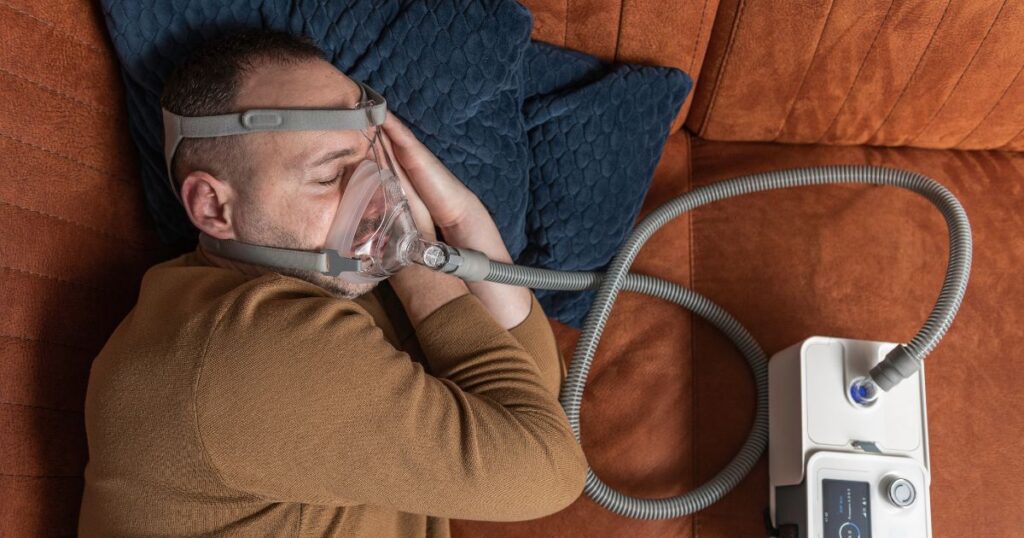Introduction
People with sleep apnea face many challenges. While continuous positive airway pressure (CPAP) therapy remains the primary treatment for sleep apnea, but alternative methods are being investigated to improve efficacy and patient compliance. Nebulizers, typically used for respiratory conditions, may help treat sleep apnea. This brief overview discusses nebulizers’ potential to treat sleep apnea. We aim to determine that can a nebulizer help with sleep apnea by reviewing the research and insights into its effects.
Can a Nebulizer Help with Sleep Apnea?
A nebulizer can help manage sleep apnea by delivering medications directly to the airways to open them and improve breathing. Sleep apnea patients can use a nebulizer to administer bronchodilators or corticosteroids to reduce inflammation and open air passages for easier breathing.
When used with CPAP, the nebulizer can improve sleep apnea treatment. The CPAP machine maintains an open airway, while the nebulizer delivers medication to improve airflow and relieve breathing problems.
Before using a nebulizer with a CPAP machine, consult a doctor for advice and medication. Next, they should set up the nebulizer and CPAP machine to deliver medication and provide continuous positive airway pressure. The healthcare professional’s instructions must be followed to safely and effectively administer medication during sleep. Sleep apnea patients can breathe better and manage their condition better with nebulizers.
Benefits of Using a Nebulizer for Sleep Apnea
Sleep apnea disrupts breathing while sleeping, resulting in poor sleep and long-term health issues. Sleep apnea can be treated with nebulizers. The lungs receive medication directly from nebulizers, making sleep apnea treatment effective. In this section, we’ll discuss sleep apnea nebulizers’ ease of use, targeted treatment, and potential to improve sleep quality.
Better Breathing
Effective breathing improves health and reduces stress and anxiety. Deep breathing, diaphragmatic breathing, and alternate nostril breathing improve respiratory function and mood.
Go somewhere quiet and comfortable to sit or lie down and practice deep breathing. Inhale deeply through your nose, raising your abdomen as you breathe. After holding your breath for a few seconds, slowly exhale through your mouth, lowering your abdomen. Repeat for several minutes to relax and de-stress.
Diaphragmatic breathing increases oxygen supply and relaxation by breathing deeply from the diaphragm muscle. Sit or lie down comfortably with one hand on your chest and the other on your abdomen. Breathe deeply through your nose, expanding your abdomen. Your abdomen contracts as you slowly exhale. Practice diaphragmatic breathing daily for a few minutes to improve breathing.
Yoga’s alternate nostril breathing, or Nadi Shodhana, balances energy and relaxes the body. Sit comfortably, block one nostril with your thumb, and inhale through the other. Change nostrils and exhale through the other. For focus and stress relief, repeat this pattern for a few minutes.
Following these breathing patterns regularly can improve health, reduce stress, and boost emotional well-being. Deep, diaphragmatic, and alternate nostril breathing can improve relaxation, respiratory function, and emotional balance. These breathing techniques can improve stress management, focus, and well-being when practiced daily.
Restful Sleep
Obstructive sleep apnea and asthma are closely related and can worsen each other’s symptoms and health. Sleep apnea disrupts sleep and causes fatigue, worsening asthma symptoms and lung function. However, asthma can worsen sleep apnea by increasing airway inflammation and narrowing, resulting in more frequent and severe episodes.
Obesity, smoking, and nasal congestion are risk factors for both. Weight loss, smoking cessation, and CPAP therapy for sleep apnea can treat both disorders. Treatment for nasal congestion and asthma medications like inhaled corticosteroids and bronchodilators can also improve symptoms.
Risks of Using a Nebulizer for Sleep Apnea
Sleep apnea nebulizers have risks and side effects. Nebulizers deliver medication to the lungs, but they can cause throat irritation, hoarseness, and dry mouth. In some cases, nebulizer use can increase the risk of oral thrush.
Sleep apnea nebulizers may affect severe asthma symptoms. A nebulizer can deliver asthma medication directly to the lungs, but it may not treat sleep apnea. The best sleep apnea treatment is Continuous Positive Airway Pressure (CPAP) therapy, which keeps airways open during sleep.
It’s important to weigh the pros and cons of sleep apnea nebulizers. Consider how nebulizer use may affect asthma management and whether CPAP therapy is better for sleep apnea and asthma symptoms. Consult a doctor to determine the best sleep apnea and asthma treatment.
Conclusion
We discussed can a nebulizer help with sleep apnea. In conclusion, nebulizer therapy as a sleep apnea adjunct is an intriguing sleep medicine avenue. While CPAP is still the mainstay of sleep apnea treatment, nebulizers are gaining popularity for targeting respiratory function.
Nebulizers may directly treat sleep apnea, but the evidence is still growing. Nebulizer therapy may improve airway function and reduce inflammation, which may contribute to sleep apnea, according to early research and anecdotes. To determine the efficacy, safety, and appropriate use of nebulizers for sleep apnea, more research is needed.
FAQs
Can sleep apnea cause inflammation in the body?
Yes, sleep apnea increases inflammation. Recurrent breathing interruptions and oxygen desaturation during sleep can cause inflammation. Chronic low-grade inflammation may cause or worsen cardiovascular and metabolic diseases.
Can sleep apnea cause autoimmune?
Some studies suggest that sleep apnea may increase the risk of autoimmune disorders, though the relationship is unclear. Sleep apnea’s chronic inflammation may trigger or worsen autoimmune conditions.
Can you have body aches from sleep apnea?
Yes, sleep apnea can cause body aches. Musculoskeletal pain can result from sleep disruptions and physiological stress. Effective sleep apnea treatment may reduce such symptoms.







